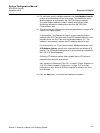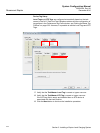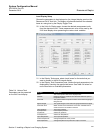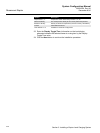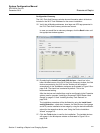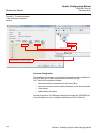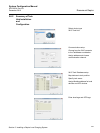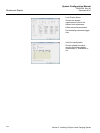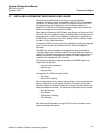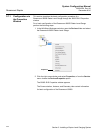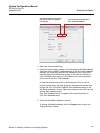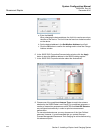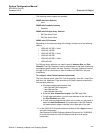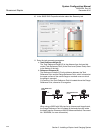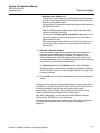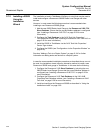
System Configuration Manual
300510EN, Rev AA
December 2010
5-51
Rosemount Raptor
Section 5. Installing a Raptor Level Gauging System
5.7 INSTALLING A ROSEMOUNT 5900S RADAR LEVEL GAUGE
The Rosemount 5900S Radar Level Gauge is typically installed in
TankMaster WinSetup as part of the Rosemount 2410 Tank Hub installation
procedure. In a following step, the 5900S is configured via the 5900S RLG
Properties window, see “Configuration via the Properties Window” on
page 5-52. The 5900S RLG Properties window includes tabs for basic and
advanced configuration of a Rosemount 5900S.
When adding a Rosemount 5900S Radar Level Gauge to a Rosemount 2410
Tank Hub in an existing Raptor system, the 5900S needs to be mapped to the
appropriate tank in the 2410 tank database. Configuration is performed via
the 5900S RLG Properties window. See “Adding a Tank to a Raptor System”
on page 5-114 for further information.
A Rosemount 5900S is most conveniently installed by utilizing the integrated
option included as part of the Rosemount 2410 Tank Hub installation
procedure.
The 5900S can also be installed and configured by using the WinSetup
installation Wizard (see “Installing a 5900S Using the Installation Wizard” on
page 5-58). This method should only be used in exceptional cases when, for
example, the 5900S is connected to the Tankbus at a later stage and not
available when installing the 2410 Tank Hub.
The following configuration steps are included in the 5900S Radar Level
Gauge basic configuration:
• communication parameters
• antenna type
• tank geometry
Configuration of a 5900S may also include:
• Tank Scan
• Empty Tank Handling
Due to the properties of the product, the tank shape, or other circumstances,
further configuration may be needed in addition to the basic configuration.
Disturbing objects and turbulent conditions in the tank may also require that
advanced measures are taken. The advanced configuration options include:
• Tank Environment
•Tank Shape
• Surface Echo Tracking
• Filter Settings
See “Advanced Configuration” on page 5-62 for further information on the
advanced configuration options.



